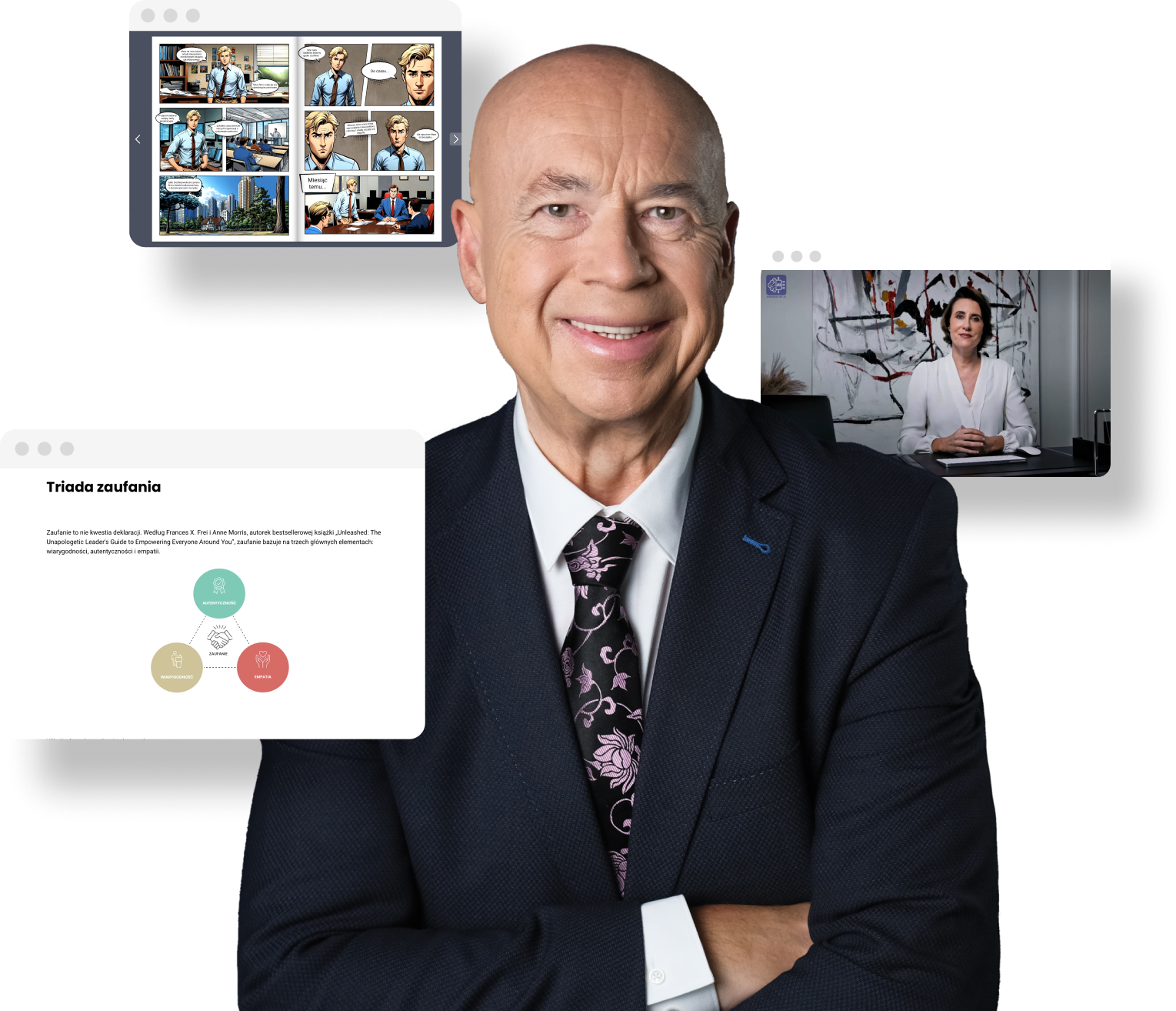
Terms and Conditions
This agreement applies as between you, the User of this Website and ICAN Institute sp. z o.o., the owner(s) of this Website. Your agreement to comply with and be bound by Clauses 1, 2, 4 – 11 and 15 – 25 of these Terms and Conditions is deemed to occur upon your first use of the Website. Clauses 3 and 12 – 14 apply only to the sale of Services. If you do not agree to be bound by these Terms and Conditions, you should stop using the Website immediately.
No part of this Website is intended to constitute a contractual offer capable of acceptance. Your order constitutes a contractual offer and Our acceptance of that offer is deemed to occur upon Our sending a confirmation email to you indicating that your order has been accepted.
No part of this Website is intended to constitute a contractual offer capable of acceptance. Your order constitutes a contractual offer and Our acceptance of that offer is deemed to occur upon Our sending a confirmation email to you indicating that your order has been accepted.
1. Definitions and Interpretation
In this Agreement the following terms shall have the following meanings:
"Account": means collectively the personal information, Payment Information and credentials used by Users to access Paid Content and / or any communications System on the Website;
"Content": means any text, graphics, images, audio, video, software, data compilations and any other form of information capable of being stored in a computer that appears on or forms part of this Website;
"Facilities": means collectively any online facilities, tools, services or information that ICAN Institute sp. z o.o. makes available through the Website either now or in the future;
"Services": means the services available to you through this Website, specifically use of the ICAN Institute sp. z o.o. proprietary e-learning platform;
"Payment Information": means any details required for the purchase of Services from this Website. This includes, but is not limited to, credit / debit card numbers, bank account numbers and sort codes;
"Premises": Means Our place(s) of business located at [ADDRESS];
"System": means any online communications infrastructure that ICAN Institute sp. z o.o. makes available through the Website either now or in the future. This includes, but is not limited to, web-based email, message boards, live chat facilities and email links;
"User" / "Users": means any third party that accesses the Website and is not employed by ICAN Institute sp. z o.o. Ltd and acting in the course of their employment;
"Website": means the website that you are currently using (onlinelearning.ican.pl) and any sub-domains of this site (e.g. subdomain.yourschool.com) unless expressly excluded by their own terms and conditions; and
"We/Us/Our": means ICAN Institute sp. z o.o., a company incorporated in [COUNTRY] with Company registration Number [123456] , located at [Address].
2. Age Restrictions
Persons under the age of 18 should use this Website only with the supervision of an Adult. Payment Information must be provided by or with the permission of an Adult.
3. Business Customers
These Terms and Conditions also apply to customers procuring Services in the course of business.
4. Intellectual Property
- 4.1 Subject to the exceptions in Clause 5 of these Terms and Conditions, all Content included on the Website, unless uploaded by Users, including, but not limited to, text, graphics, logos, icons, images, sound clips, video clips, data compilations, page layout, underlying code and software is the property of ICAN Institute sp. z o.o., our affiliates or other relevant third parties. By continuing to use the Website you acknowledge that such material is protected by applicable [COUNTRY] and International intellectual property and other laws.
- 4.2 Subject to Clause 6 you may not reproduce, copy, distribute, store or in any other fashion re-use material from the Website unless otherwise indicated on the Website or unless given Our express written permission to do so.
5. Third Party Intellectual Property
- 5.1 Unless otherwise expressly indicated, all Intellectual Property rights including, but not limited to, Copyright and Trademarks, in product images and descriptions belong to the manufacturers or distributors of such products as may be applicable.
- 5.2 Subject to Clause 6 you may not reproduce, copy, distribute, store or in any other fashion re-use such material unless otherwise indicated on the Website or unless given express written permission to do so by the relevant manufacturer or supplier.
6. Fair Use of Intellectual Property
Material from the Website may be re-used without written permission where any of the exceptions detailed in Chapter III of the Copyright Designs and Patents Act 1988 apply.
7. Links to Other Websites
This Website may contain links to other sites. Unless expressly stated, these sites are not under the control of ICAN Institute sp. z o.o. or that of Our affiliates. We assume no responsibility for the content of such websites and disclaim liability for any and all forms of loss or damage arising out of the use of them. The inclusion of a link to another site on this Website does not imply any endorsement of the sites themselves or of those in control of them.
8. Links to this Website
Those wishing to place a link to this Website on other sites may do so only to the home page of the site onlinelearning.ican.pl without Our prior permission. Deep linking (i.e. links to specific pages within the site) requires Our express written permission. To find out more please contact Us by email at pomoc@ican.pl or call us in the following number: your_number.
9. Use of Communications Facilities
- 9.1 When using any System on the Website you should do so in accordance with the following rules. Failure to comply with these rules may result in your Account being suspended or closed:
- 9.1.1 You must not use obscene or vulgar language;
- 9.1.2 You must not submit Content that is unlawful or otherwise objectionable. This includes, but is not limited to, Content that is abusive, threatening, harassing, defamatory, ageist, sexist or racist;
- 9.1.3 You must not submit Content that is intended to promote or incite violence;
- 9.1.4 It is advised that submissions are made using the English language as We may be unable to respond to enquiries submitted in any other languages;
- 9.1.5 The means by which you identify yourself must not violate these Terms and Conditions or any applicable laws;
- 9.1.6 You must not impersonate other people, particularly employees and representatives of ICAN Institute sp. z o.o. or Our affiliates; and
- 9.1.7 You must not use Our System for unauthorised mass-communication such as "spam" or "junk mail".
- 9.2 You acknowledge that ICAN Institute sp. z o.o. reserves the right to monitor any and all communications made to Us or using Our System.
- 9.3 You acknowledge that ICAN Institute sp. z o.o. may retain copies of any and all communications made to Us or using Our System.
- 9.4 You acknowledge that any information you send to Us through Our System may be modified by Us in any way and you hereby waive your moral right to be identified as the author of such information. Any restrictions you may wish to place upon Our use of such information must be communicated to Us in advance and We reserve the right to reject such terms and associated information.
10. Accounts
- 10.1 In order to procure Services on this Website and to use certain other parts of the System, you are required to create an Account which will contain certain personal details and Payment Information which may vary based upon your use of the Website as We may not require payment information until you wish to make a purchase. By continuing to use this Websiteyou represent and warrant that:
- 10.1.1 all information you submit is accurate and truthful;
- 10.1.2 you have permission to submit Payment Information where permission may be required; and
- 10.1.3 you will keep this information accurate and up-to-date. Your creation of an Account is further affirmation of your representation and warranty.
- 10.2 It is recommended that you do not share your Account details, particularly your username and password. We accept no liability for any losses or damages incurred as a result of your Account details being shared by you. If you use a shared computer, it is recommended that you do not save your Account details in your internet browser.
- 10.3 If you have reason to believe that your Account details have been obtained by another person without consent, you should contact Us immediately to suspend your Account and cancel any unauthorised orders or payments that may be pending. Please be aware that orders or payments can only be cancelled up until provision of Services has commenced. In the event that an unauthorised provision commences prior to your notifying Us of the unauthorised nature of the order or payment then you shall be charged for the period from the commencement of the provision of services until the date you notified us and may be charged for a billing cycle of one month.
- 10.4 When choosing your username you are required to adhere to the terms set out above in Clause 9. Any failure to do so could result in the suspension and/or deletion of your Account.
11. Termination and Cancellation of Accounts
- 11.1 Either ICAN Institute sp. z o.o. or you may terminate your Account. If We terminate your Account, you will be notified by email and an explanation for the termination will be provided. Notwithstanding the foregoing, We reserve the right to terminate without giving reasons.
- 11.2 If We terminate your Account, any current or pending orders or payments on your Account will be cancelled and provision of Services will not commence.
12. Services, Pricing and Availability
- 12.1 Whilst every effort has been made to ensure that all general descriptions of Services available from ICAN Institute sp. z o.o. correspond to the actual Services that will be provided to you, We are not responsible for any variations from these descriptions as the exact nature of the Services may vary depending on your individual requirements and circumstances. This does not exclude Our liability for mistakes due to negligence on Our part and refers only to variations of the correct Services, not different Services altogether. Please refer to sub-Clause 13.8 for incorrect Services.
- 12.2 Where appropriate, you may be required to select the required Plan of Services.
- 12.3 We neither represent nor warrant that such Services will be available at all times and cannot necessarily confirm availability until confirming your Order. Availability indications are not provided on the Website.
- 12.4 All pricing information on the Website is correct at the time of going online. We reserve the right to change prices and alter or remove any special offers from time to time and as necessary.
- 12.5 In the event that prices are changed during the period between an order being placed for Services and Us processing that order and taking payment, then the price that was valid at the time of the order shall be used.
13. Orders and Provision of Services
- 13.1 No part of this Website constitutes a contractual offer capable of acceptance. Your order constitutes a contractual offer that We may, at Our sole discretion, accept. Our acceptance is indicated by Us sending to you an order confirmation email. Only once We have sent you an order confirmation email will there be a binding contract between ICAN Institute sp. z o.o. and you.
- 13.2 Order confirmations under sub-Clause 13.1 will be sent to you before the Services begin and shall contain the following information:
- 13.2.1 Confirmation of the Services ordered including full details of the main characteristics of those Services;
- 13.2.2 Fully itemised pricing for the Services ordered including, where appropriate, taxes, delivery and other additional charges;
- 13.2.3 Relevant times and dates for the provision of the Services;
- 13.2.4 User credentials and relevant information for accessing those services.
- 13.3 If We, for any reason, do not accept your order, no payment shall be taken under normal circumstances. In any event, any sums paid by you in relation to that order will be refunded within 14 calendar days.
- 13.4 Payment for the Services shall be taken via your chosen payment method, immediately for any setup fee that corresponds to the service plan you purchased and at the same day of each subsequent month (“billing cycle”) for charges accrued during the previous month (“billing cycle”) AND/OR as indicated in the order confirmation you received.
- 13.5 We aim to fulfill your Order within 2-3 working days or if not, within a reasonable period following your Order, unless there are exceptional circumstances. If we cannot fulfill your Order within a reasonable period, we will inform you at the time you place the Order by a note on the relevant web page or by contacting you directly after you place your Order. Time is not of the essence of the Contract, which means we will aim to fulfill your Order within any agreed timescales but this is not an essential term of the Contract and we will not be liable to you if we do not do so. If the Services are to begin within 14 calendar days of Our acceptance of your order, at your express request, you will be required to expressly acknowledge that your statutory cancellation rights, detailed below in Clause 14, will be affected.
- 13.6 ICAN Institute sp. z o.o. shall use all Our reasonable endeavours to provide the Services with reasonable skill and care, commensurate with best trade practice.
- 13.7 In the event that Services are provided that are not in conformity with your order and thus incorrect, you should contact Us immediately to inform Us of the mistake. We will ensure that any necessary corrections are made within five (5) working days.
- Additional terms and conditions may apply to the provision of certain Services. You will be asked to read and confirm your acceptance of any such terms and conditions when completing your Order.
- 13.8 ICAN Institute sp. z o.o. provides technical support via our online support forum and/or phone. ICAN Institute sp. z o.o. makes every effort possible to respond in a timely manner but we do not guarantee a particular response time.
14. Cancellation of Orders and Services
We want you to be completely satisfied with the Products or Services you order from ICAN Institute sp. z o.o.. If you need to speak to us about your Order, then please contact customer care on [PHONE NUMBER], or by email at pomoc@ican.pl or write to us at our address (see section 1 above). You may cancel an Order that we have accepted or cancel the Contract. If any Specific Terms accompanying the Service contain terms about cancelling the Service, the cancellation policy in the Specific Terms will apply.
- 14.1 If you are a consumer based within the European Union, you have a statutory right to a “cooling off” period. This period begins once your order is confirmed and the contract between ICAN Institute sp. z o.o. and you is formed and ends at the end of 14 calendar days after that date. If you change your mind about the Services within this period and wish to cancel your order, please inform Us immediately using the following email: pomoc@ican.pl. Your right to cancel during the cooling off period is subject to the provisions of sub-Clause 14.2.
- 14.2 As specified in sub-Clause 13.6, if the Services are to begin within the cooling off period you are required to make an express request to that effect. By requesting that the Services begin within the 14 calendar day cooling off period you acknowledge and agree to the following:
- 14.2.1 If the Services are fully performed within the 14 calendar day cooling off period, you will lose your right to cancel after the Services are complete.
- 14.2.2 If you cancel the Services after provision has begun but is not yet complete you will still be required to pay for the Services supplied up until the point at which you inform Us that you wish to cancel. The amount due shall be calculated in proportion to the full price of the Services and the actual Services already provided. Any sums that have already been paid for the Services shall be refunded subject to deductions calculated in accordance with the foregoing. Refunds, where applicable, will be issued within 5 working days and in any event no later than 14 calendar days after you inform Us that you wish to cancel.
- 14.3 Cancellation of Services after the 14 calendar day cooling off period has elapsed shall be subject to the specific terms governing those Services and may be subject to a minimum contract duration.
15. Privacy
Use of the Website is also governed by Our Privacy Policy (onlinelearning.ican.pl/privacy) which is incorporated into these Terms and Conditions by this reference. To view the Privacy Policy, please click on the link above.
16. How We Use Your Personal Information (Data Protection)
- 16.1 All personal information that We may collect (including, but not limited to, your name and address) will be collected, used and held in accordance with the provisions of the Data Protection Act 1998 and your rights under that Act.
- 16.2 We may use your personal information to:
- 16.2.1 Provide Our Services to you;
- 16.2.2 Process your payment for the Services; and
- 16.2.3 Inform you of new products and services available from Us. You may request that We stop sending you this information at any time.
- 16.3 In certain circumstances (if, for example, you wish to purchase Services on credit), and with your consent, We may pass your personal information on to credit reference agencies. These agencies are also bound by the Data Protection Act 1998 and should use and hold your personal information accordingly.
- 16.4 We will not pass on your personal information to any other third parties without first obtaining your express permission.
17. Disclaimers
- 17.1 We make no warranty or representation that the Website will meet your requirements, that it will be of satisfactory quality, that it will be fit for a particular purpose, that it will not infringe the rights of third parties, that it will be compatible with all systems, that it will be secure and that all information provided will be accurate. We make no guarantee of any specific results from the use of our Service or Services.
- 17.2 No part of this Website is intended to constitute advice and the Content of this Website should not be relied upon when making any decisions or taking any action of any kind.
- 17.3 No part of this Website is intended to constitute a contractual offer capable of acceptance.
- 17.4 Whilst We use reasonable endeavours to ensure that the Website is secure and free of errors, viruses and other malware, you are strongly advised to take responsibility for your own internet security, that of your personal details and your computers.
18. Changes to the Facilities and these Terms and Conditions
We reserve the right to change the Website, its Content or these Terms and Conditions at any time. You will be bound by any changes to the Terms and Conditions from the first time you use the Website following the changes. If We are required to make any changes to these Terms and Conditions by law, these changes will apply automatically to any orders currently pending in addition to any orders placed by you in the future.
19. Availability of the Website
- 19.1 The Website is provided “as is” and on an “as available” basis. ICAN Institute sp. z o.o. uses industry best practices to provide a high uptime, including a fault-tolerant architecture hosted in cloud servers. We give no warranty that the Website or Facilities will be free of defects and / or faults and we do not provide any kind of refund for outages. We provide no warranties (express or implied) of fitness for a particular purpose, accuracy of information, compatibility and satisfactory quality.
- 19.2 We accept no liability for any disruption or non-availability of the Website resulting from external causes including, but not limited to, ISP equipment failure, host equipment failure, communications network failure, power failure, natural events, acts of war or legal restrictions and censorship.
20. Limitation of Liability
- 20.1 To the maximum extent permitted by law, We accept no liability for any direct or indirect loss or damage, foreseeable or otherwise, including any indirect, consequential, special or exemplary damages arising from the use of the Website or any information contained therein. You should be aware that you use the Website and its Content at your own risk.
- 20.2 Nothing in these Terms and Conditions excludes or restricts .
- 20.3 Nothing in these Terms and Conditions excludes or restricts ICAN Institute sp. z o.o.'s liability for any direct or indirect loss or damage arising out of the incorrect provision of Services or out of reliance on incorrect information included on the Website.
- 20.4 In the event that any of these terms are found to be unlawful, invalid or otherwise unenforceable, that term is to be deemed severed from these Terms and Conditions and shall not affect the validity and enforceability of the remaining Terms and Conditions. This term shall apply only within jurisdictions where a particular term is illegal.
21. No Waiver
In the event that any party to these Terms and Conditions fails to exercise any right or remedy contained herein, this shall not be construed as a waiver of that right or remedy.
22. Previous Terms and Conditions
In the event of any conflict between these Terms and Conditions and any prior versions thereof, the provisions of these Terms and Conditions shall prevail unless it is expressly stated otherwise.
23. Third Party Rights
Nothing in these Terms and Conditions shall confer any rights upon any third party. The agreement created by these Terms and Conditions is between you and ICAN Institute sp. z o.o..
24. Communications
- 24.1 All notices / communications shall be given to Us either by post to Our Premises (see address above) or by email to pomoc@ican.pl. Such notice will be deemed received 3 days after posting if sent by first class post, the day of sending if the email is received in full on a business day and on the next business day if the email is sent on a weekend or public holiday.
- 24.2 We may from time to time, if you opt to receive it, send you information about Our products and/or services. If you do not wish to receive such information, please click on the ‘Unsubscribe’ link in any email which you receive from Us.
25. Law and Jurisdiction
These Terms and Conditions and the relationship between you and ICAN Institute sp. z o.o. shall be governed by and construed in accordance with the Law of England and Wales and ICAN Institute sp. z o.o. and you agree to submit to the exclusive jurisdiction of [COUNTRY].
Dokumenty
Kontakt
-
ICAN Institute Spółka z ograniczoną odpowiedzialnością
-
Al. Niepodległości 18, 02-653 Warszawa
-
Pomoc techniczna 22 213 07 96
Copyright © 2026
This is the title of this dialog box.
This is the descriptive text of this dialog box.
Pobierz już teraz!
Empty space, drag to resize
Zacznij korzystać z Planu wdrożenia kompetencji i przekuj teorię w praktykę, wzmacniając swoje kompetencje zawodowe i zwiększając skuteczność nauki.
Uwaga!
Plan wdrożenia kompetencji jest przeznaczony do pracy w ramach cyklu „Mistrzowska rekrutacja”, składającego się z dwóch szkoleń:
-
Mistrzowska rekrutacja: Od strategii do selekcji (tu jesteś )
-
Mistrzowska rekrutacja: Celne wybory, silne zespoły
By osiągnąć najlepsze efekty, szkolenia dostępne w ramach cyklu warto zrealizować jedno po drugim. Plan wdrożenia kompetencji będzie Twoim przewodnikiem w tym procesie i pomoże Ci przekuć zdobytą wiedzę na konkretne rezultaty.
Powodzenia!
Zespół ICAN Online Learning
Zespół ICAN Online Learning
Pobierz już teraz!
Empty space, drag to resize
Zacznij korzystać z Planu wdrożenia kompetencji i przekuj teorię w praktykę, wzmacniając swoje kompetencje zawodowe i zwiększając skuteczność nauki.
Uwaga!
Plan wdrożenia kompetencji jest przeznaczony do pracy w ramach cyklu „Mistrzowska rekrutacja”, składającego się z dwóch szkoleń:
-
Mistrzowska rekrutacja: Od strategii do selekcji
-
Mistrzowska rekrutacja: Celne wybory, silne zespoły (tu jesteś)
By osiągnąć najlepsze efekty, szkolenia dostępne w ramach cyklu warto zrealizować jedno po drugim. Plan wdrożenia kompetencji będzie Twoim przewodnikiem w tym procesie i pomoże Ci przekuć zdobytą wiedzę na konkretne rezultaty.
Jeżeli zrealizowałeś(-łaś) już szkolenie „Mistrzowska rekrutacja: Od strategii do selekcji”, kontynuuj pracę w planie wdrożenia, który pobrałeś(-łaś) na początku tego szkolenia.
Jeżeli nie, zachęcamy Cię, byś zaczął/zaczęła pracę właśnie od niego.
Jeżeli natomiast z jakiegoś powodu chcesz zrealizować tylko szkolenie „Mistrzowska rekrutacja: Celne wybory, silne zespoły”, pobierz plan wdrożenia załączony poniżej.
Powodzenia!
Zespół ICAN Online Learning
Zespół ICAN Online Learning
Zrozumienie strategii firmy i jej długoterminowych celów
Strategia rozwoju pracowników powinna być dostosowana do misji, ogólnej strategii firmy i jej celów. Organizacja uwzględnia zarówno uwarunkowania wewnętrzne (np. posiadane zasoby i kulturę organizacyjną), jak i zewnętrzne (np. sytuację na rynku).

Określenie kluczowych kompetencji
Firma musi określić, które kompetencje są niezbędne dla utrzymania konkurencyjności na rynku – zarówno teraz, jak i w przyszłości. Każdy strategiczny priorytet firmy powinien znaleźć odzwierciedlenie w podejściu do rozwoju kompetencji.

Diagnoza potrzeb, możliwości i aspiracji pracowników
Aby poznać potrzeby rozwojowe, aspiracje i potencjał pracowników, menedżer przeprowadza rozmowy rozwojowe, oceny okresowe, ankiety lub badania 360 stopni. Podczas rozmów rozwojowych wspólnie określane są obszary, w których pracownicy potrzebują i chcą się rozwijać, a także te, które są priorytetowe dla firmy.
Identyfikacja luk kompetencyjnych
Za analizę stanowisk, określenie profili kompetencyjnych i identyfikację luk, które mogą ograniczać realizację celów firmy, najczęściej odpowiedzialny jest dział HR. We współpracy z menedżerem tworzy on mapy kompetencji i opisy stanowisk pracy. Udział menedżera w tych procesach jest jednak niezwykle ważny, ponieważ dział HR nie posiada wystarczającej wiedzy o pracownikach i potrzebach zespołów.
Ustalenie konkretnych celów, które strategia rozwoju ma osiągnąć
Strategia rozwoju może mieć różne cele, np.: przygotowanie zespołu do nowych wyzwań, rozwój liderów, adaptację pracowników do zmian technologicznych czy też zatrzymanie w firmie talentów. Cele te muszą być jasne, mierzalne i powiązane z zadaniami zespołu.

Tworzenie indywidualnych i zespołowych planów rozwojowych
Ważne jest, aby plany rozwojowe były zgodne z potencjałem i oczekiwaniami pracowników, a także wymaganiami organizacji. Powinny brać pod uwagę luki kompetencyjne i przyszłe potrzeby pracowników, m.in. w zakresie upskillingu i reskillingu. Plany działań rozwojowych powinny uwzględniać każdy etap życia pracownika, od onboardingu po awanse i przejścia między rolami. W praktyce mogą one obejmować szkolenia, projekty rotacyjne, mentoring, programy talentowe i wiele innych, które poznasz podczas tego szkolenia.
Wspieranie pracowników w rozwoju
Rola menedżera nie kończy się na planowaniu. Lider wspiera pracowników w realizacji planów, aby nowe kompetencje pracowników nie były tylko „teorią”, lecz miały praktyczne przełożenie na codzienną pracę.

Monitorowanie efektów
Po wdrożeniu działań rozwojowych najczęściej to dział HR monitoruje ich efekty np. poprzez wskaźniki efektywności, retencji czy zaangażowania pracowników.

Empty space, drag to resize
Analiza luk kompetencyjnych – identyfikacja realnych deficytów
Metoda ta pozwala określić, jak bardzo aktualne kompetencje pracowników odbiegają od oczekiwanego poziomu. Pomaga także zidentyfikować obszary wymagające wsparcia szkoleniowego i dobrze zaplanować ścieżki kariery oraz sukcesji.
Jak to zrobić?
Jak to zrobić?
-
Określ wymagania na danym stanowisku – zarówno w zakresie kompetencji twardych, jak i miękkich.
-
Oceń aktualny poziom umiejętności pracowników, bazując na wynikach ich pracy, Twoich wcześniejszych ocenach, wynikach testów kompetencyjnych i samoocen.
-
Zidentyfikuj luki kompetencyjne i określ priorytety rozwojowe.
To wydarzenie lub sytuacja, która ma emocjonalne znaczenie.
Przykładowo:
Jedziesz rano do pracy i ucieka Ci autobus. Już wiesz, że się spóźnisz.
Przykładowo:
Jedziesz rano do pracy i ucieka Ci autobus. Już wiesz, że się spóźnisz.

To zbiór myśli i przekonań, które powstają w odpowiedzi na sytuację (A).
Przykładowo:
„Jestem spóźnialski”.
„Znowu nawaliłem”.
„Na pewno mnie zwolnią i za co ja wtedy będę żyć”?
„Szef pomyśli, że jestem nieodpowiedzialny”.
Przykładowo:
„Jestem spóźnialski”.
„Znowu nawaliłem”.
„Na pewno mnie zwolnią i za co ja wtedy będę żyć”?
„Szef pomyśli, że jestem nieodpowiedzialny”.

To konsekwencje emocjonalne lub uczucia, które są rezultatem Twojego sposobu myślenia (B) o sytuacji (A).
Przykładowo:
złość, lęk, niepokój, napięcie
Przykładowo:
złość, lęk, niepokój, napięcie

To zachowania lub działania, które wynikają z przeżywanych uczuć (C).
Przykładowo:
Przyjeżdżasz do pracy, czując napięcie, przez co masz trudności w skupieniu się na zadaniach. Może też pojawić się rozdrażnienie w kontakcie z osobami, które nie miały wpływu na Twój stan emocjonalny, ponieważ będziesz szukać sposobu na redukcję napięcia.
Przykładowo:
Przyjeżdżasz do pracy, czując napięcie, przez co masz trudności w skupieniu się na zadaniach. Może też pojawić się rozdrażnienie w kontakcie z osobami, które nie miały wpływu na Twój stan emocjonalny, ponieważ będziesz szukać sposobu na redukcję napięcia.

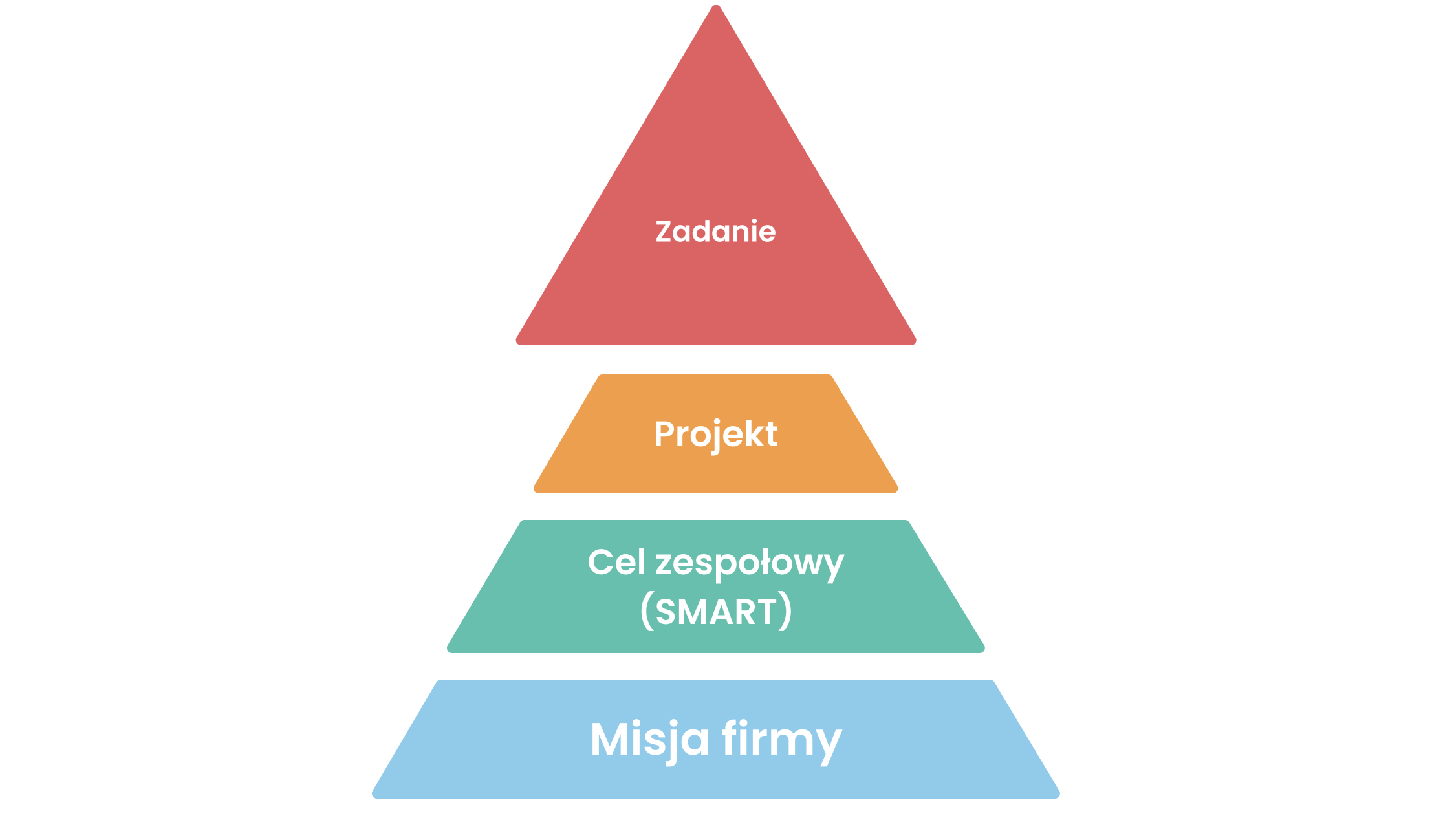
Zadanie
Napisanie tekstu pt. „Digital Sense”.
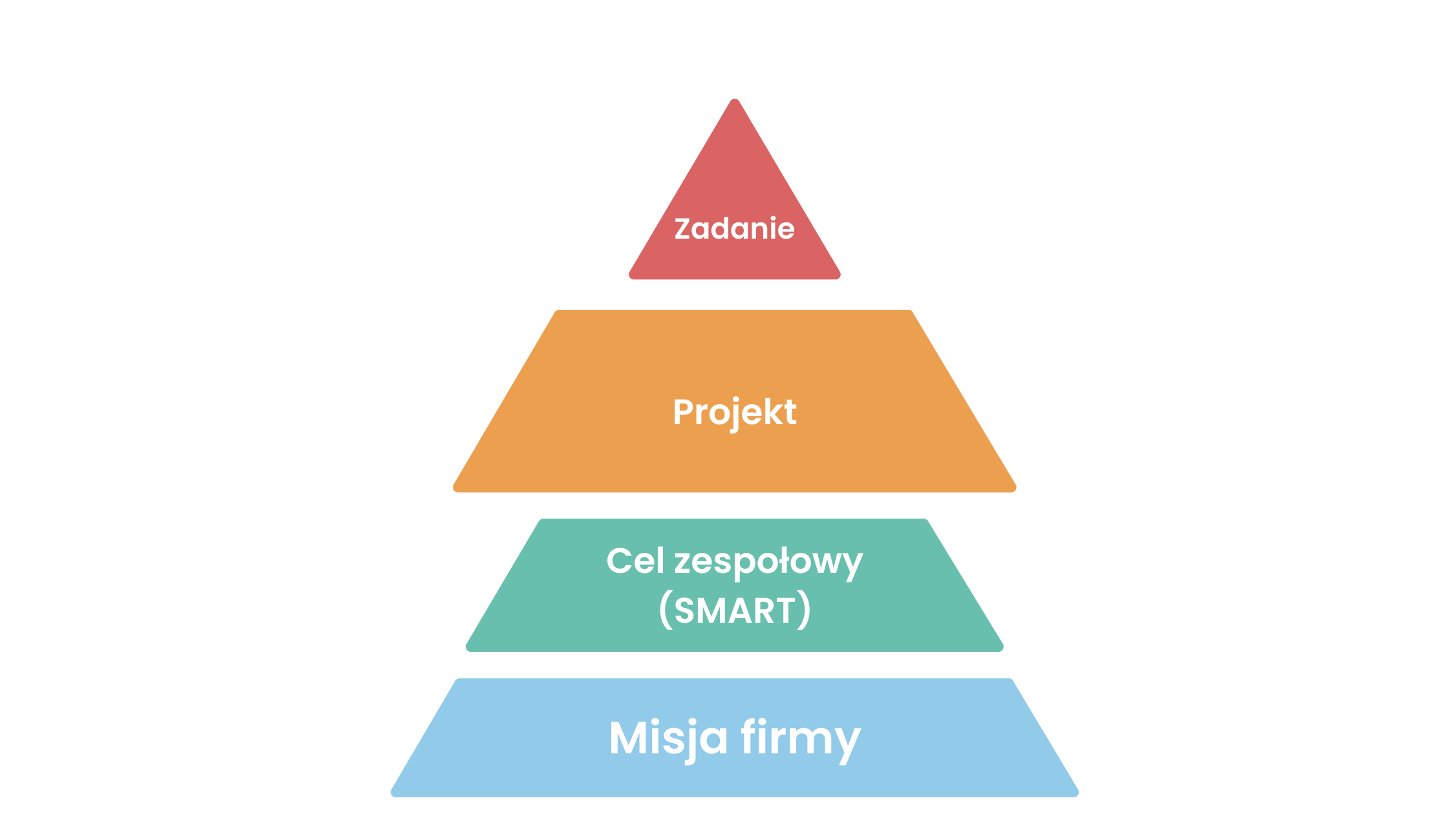
Projekt
Stworzenie szkolenia pt. „Inteligencja cyfrowa: Organizacja”.
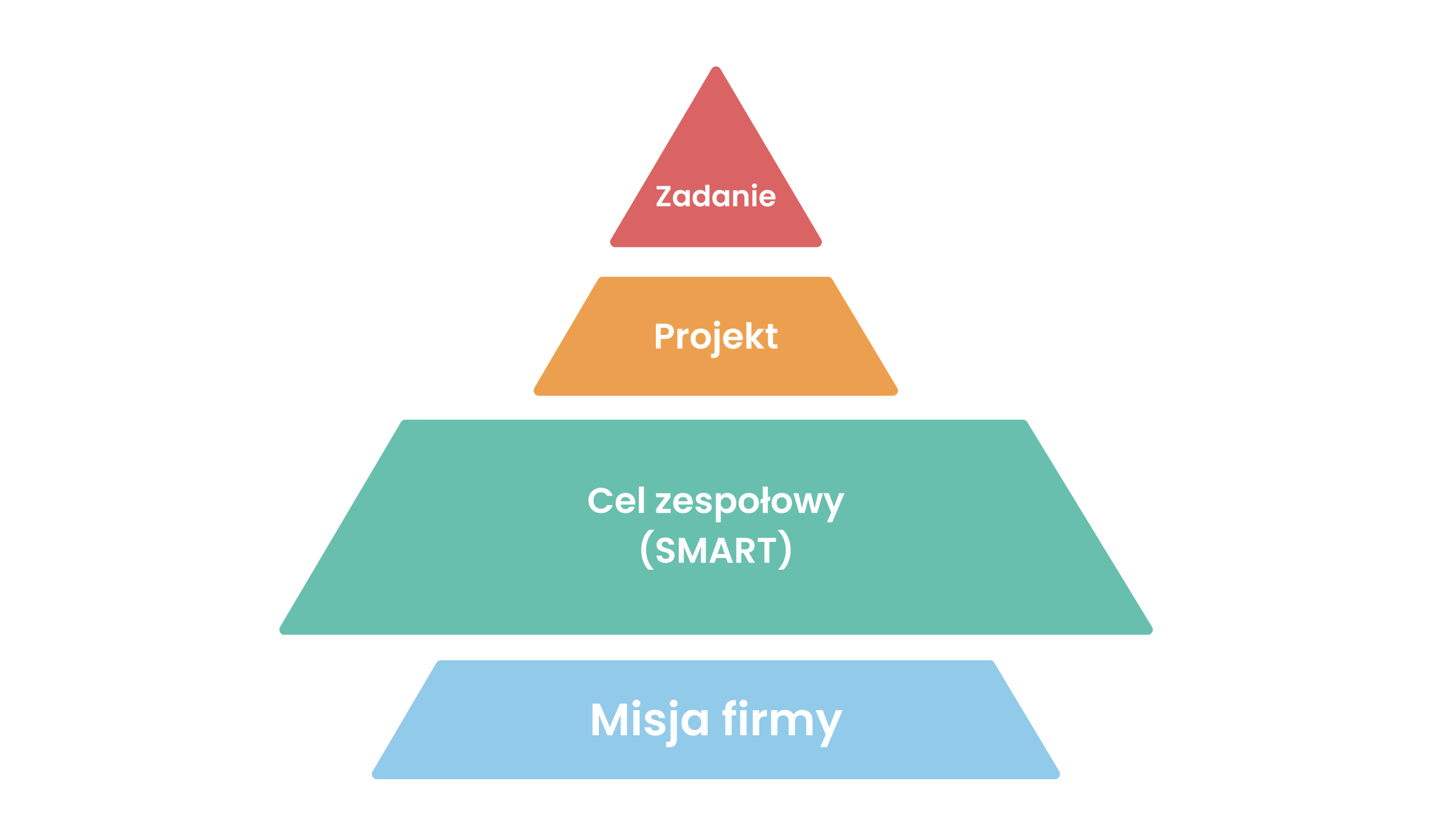
Cel zespołowy
Do końca kwartału opracujemy i opublikujemy trzy nowe szkolenia e-learningowe z zakresu inteligencji cyfrowej, które uzyskają ocenę satysfakcji uczestników na poziomie co najmniej 85%.
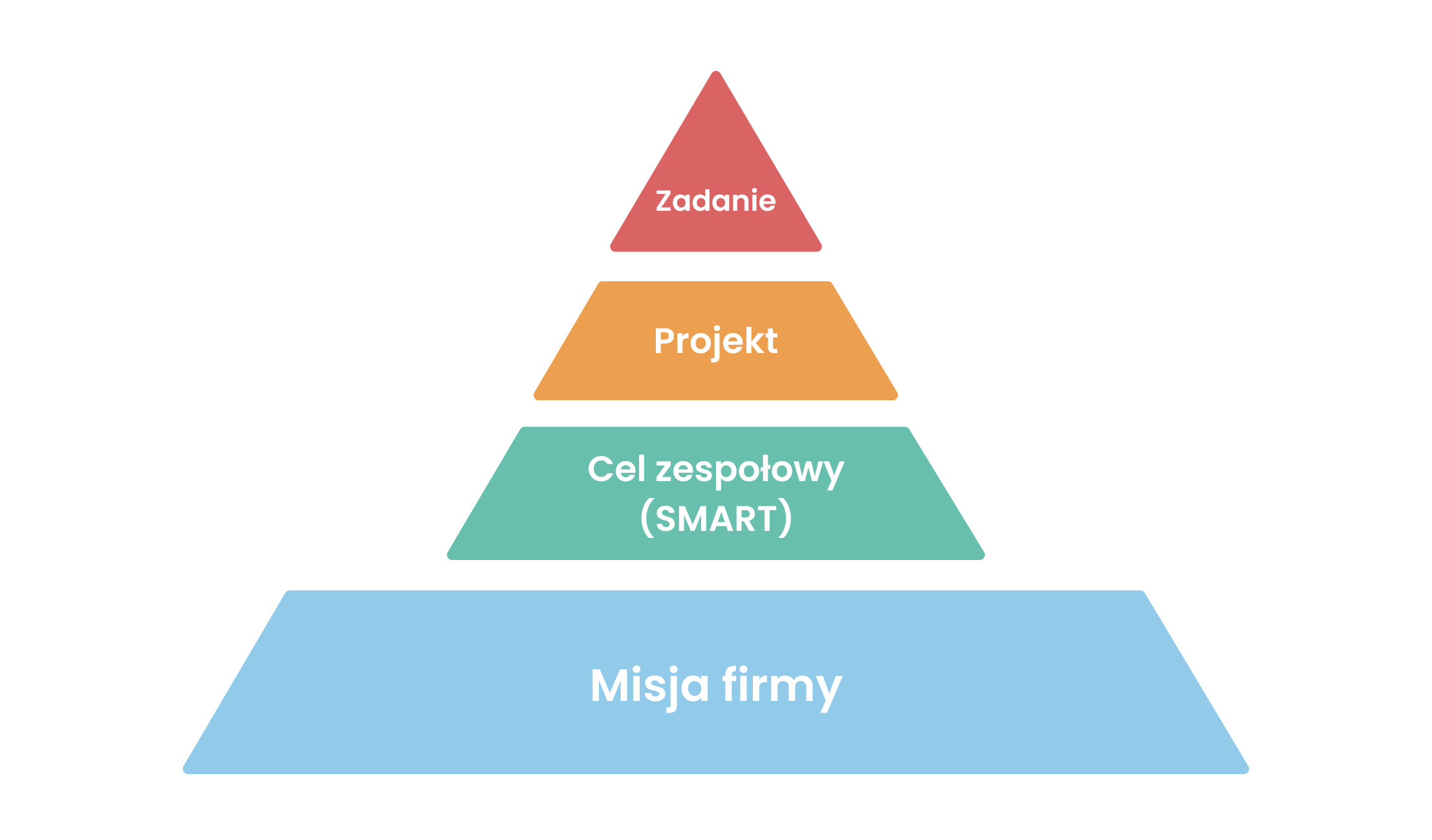
Misja firmy
Wspieranie przedsiębiorców i menedżerów w osiąganiu sukcesów poprzez dostarczanie wiedzy eksperckiej w obszarach strategii, przywództwa, zarządzania i sprzedaży.
Media społecznościowe
Media społecznościowe, zwłaszcza LinkedIn, stały się jednym z kluczowych narzędzi rekrutacyjnych. LinkedIn pozwala na docieranie zarówno do osób aktywnie poszukujących pracy, jak i do kandydatów pasywnych. Dzięki zaawansowanym narzędziom wyszukiwania i targetowania, umożliwia szybką identyfikację kandydatów z określonymi kompetencjami czy doświadczeniem.
Również inne platformy, takie jak Facebook czy Instagram, mogą być wykorzystywane w procesie rekrutacji, szczególnie w przypadku młodszych pokoleń. Kampanie reklamowe, targetowane posty czy promowanie ofert pracy w grupach tematycznych to skuteczne sposoby na zwiększenie zasięgu ogłoszeń.
Portale z ofertami pracy
Portale takie jak Pracuj.pl, Indeed czy Glassdoor wciąż są jednym z najbardziej popularnych kanałów rekrutacyjnych. Umożliwiają dotarcie do szerokiego grona kandydatów z różnych branż, którzy aktywnie poszukują pracy. Duża liczba użytkowników sprawia, że proces rekrutacji może być bardziej dynamiczny, a firmy szybko otrzymują odpowiedzi na swoje ogłoszenia.
Zakładka „Kariera” na stronie firmowej
Zakładka „Kariera” to wizytówka pracodawcy i często pierwsze miejsce, w którym potencjalni kandydaci szukają informacji o firmie i dostępnych stanowiskach. Aby dobrze pełniła swoją funkcję, powinna zawierać m.in. informacje o historii firmy, jej misji, wizji i wartościach, kulturze organizacyjnej, możliwościach rozwoju, benefitach oraz procesie rekrutacyjnym. Powinna być również funkcjonalna i umożliwiać łatwe aplikowanie.
Polecenia pracownicze
Programy rekomendacji pracowniczych to niezwykle skuteczna metoda pozyskiwania talentów, zwłaszcza na stanowiska specjalistyczne i menedżerskie. Polecenia od obecnego zespołu są cennym źródłem kandydatów, ponieważ pracownicy rekomendują osoby, z którymi sami chcieliby współpracować.
Wprowadzenie formalnych programów poleceń z odpowiednimi motywatorami (np. nagrody finansowe lub inne benefity) może znacząco zwiększyć zaangażowanie pracowników w ten proces. Ta metoda pozwala również na dotarcie do kandydatów pasywnych.
Rekrutacja na uczelniach
Uczelnie wyższe to świetne źródło młodych, zdolnych pracowników, którzy mogą wnieść świeże spojrzenie do organizacji. Udział w targach pracy oraz organizacja praktyk i staży zawodowych to sprawdzone sposoby budowania relacji z przyszłymi pracownikami. Wielu absolwentów chętnie kontynuuje współpracę z firmami, w których zdobyli pierwsze doświadczenia zawodowe.
Agencje rekrutacyjne i headhunterzy
W przypadku bardziej wymagających rekrutacji, zwłaszcza na wyższe stanowiska, warto rozważyć współpracę z agencjami rekrutacyjnymi lub specjalistami od headhuntingu. Agencje te posiadają szeroką bazę kandydatów oraz doświadczenie w wyszukiwaniu kandydatów pasywnych.
Wykorzystanie klientów, partnerów biznesowych i konkurencji
Klienci i partnerzy biznesowi mogą być doskonałym źródłem rekomendacji kandydatów. O ile relacje biznesowe pozwalają na pewne formalne i nieformalne kontakty, otwarcie się na współpracę w zakresie polecania pracowników może przynieść obustronne korzyści.
W niektórych branżach warto monitorować konkurencję i ich podejście do rekrutacji – oferowanie lepszych warunków pracy czy bardziej atrakcyjnych benefitów może przyciągnąć wartościowych specjalistów pracujących obecnie dla innych firm.
Byli pracownicy
Re-engagement, czyli ponowne zatrudnianie byłych pracowników, może być skutecznym sposobem na pozyskanie doświadczonych specjalistów, którzy znają organizację i jej kulturę. Jeśli rozstanie odbyło się w dobrej atmosferze, byli pracownicy mogą być skłonni wrócić do firmy, zwłaszcza jeśli w międzyczasie nabyli nowe, cenne kompetencje.
Targi pracy i wydarzenia branżowe
Uczestnictwo w targach pracy oraz specjalistycznych wydarzeniach branżowych to świetna okazja do budowania sieci kontaktów z potencjalnymi kandydatami. Targi pracy przyciągają zarówno młodych absolwentów, jak i osoby doświadczone, które poszukują nowych wyzwań zawodowych. Z kolei w wydarzeniach branżowych biorą udział profesjonaliści zainteresowani danym sektorem, co daje szansę na nawiązanie kontaktu z kandydatami o wysokich kwalifikacjach.
Bądź otwarty(-ta) i nawiąż przyjazną relację
Pokolenie Z jest najbardziej otwartym pokoleniem i w zamian oczekuje tego samego. Nie trzymaj się utartych schematów, gotowych rozwiązań, stereotypów czy przyzwyczajeń. Ustal wspólne cele i odwołaj się do celów firmy, strategii czy szerszego obrazu, zanim przejdziesz do szczegółów.
Buduj zaufanie
Samo stanowisko nie znaczy dla „zetek” zbyt wiele i nie wiąże się automatycznie z autorytetem. Osoba menedżera jest darzona zaufaniem, jeżeli postępuje on etycznie, jest wzorem tego, co mówi, i jest prawdziwie zaangażowany, autentyczny i szczery. To konieczne, aby informacja zwrotna została przyjęta konstruktywnie.
Trzymaj się faktów
Wspólnie ustalcie fakty, zanim przejdziesz do swojej opinii. Skup się na konkretach, zachowaj obiektywizm, mów logicznie i bądź otwarty(-ta) na nowe informacje. Połącz fakty z szerszym obrazem, celem, strategią. Brak spójności czy najmniejsze błędy w argumentach natychmiast zostaną zauważone i podważą wagę informacji zwrotnej.
Zwiększ częstotliwość feedbacku
Krótki czas skupienia, szybkość i brak cierpliwości młodego pokolenia sprawiają, że nie możesz czekać z informacją zwrotną do oceny pracowniczej. Zaplanuj czas na rozmowę co najmniej raz na tydzień.
Skracaj i jeszcze raz skracaj
Pokolenie Z z trudem akceptuje oceny pracownicze trwające godzinę. Najlepiej, aby informacja zwrotna miała 2–3 zdania. To nie oznacza, że dyskusja między Wami nie może trwać dłużej. Chodzi o Twoją jednokierunkową komunikację. Pamiętaj jednak, że pozytywna informacja zwrotna jest równie ważna i może trwać dłużej, a powinna być przekazywana dwa lub trzy razy częściej niż krytyczna.
Spotkaj się twarzą w twarz
75% pracowników z pokolenia Z woli informację zwrotną przekazywaną bezpośrednio, osobiście. Pomimo przyzwyczajenia do technologii, spotkanie twarzą w twarz jest najlepszym rozwiązaniem. Rozmowa może mieć miejsce w nieformalnym otoczeniu, np. podczas wspólnej kawy.
Wspieraj w rozwoju
Nie wystarczy, że zgodzicie się co do faktów i potrzeby zmiany. Pracownik z pokolenia Z oczekuje pomocy w wytyczeniu precyzyjnego planu działania i ustalenia punktów kontrolnych sprawdzających wprowadzanie go w życie.
Dobry urlop, lepsza praca
Brak regularnego wypoczynku zabija kreatywność. Osobom nieznajdującym czasu na odpoczynek trudniej przychodzi poszukiwanie nowych rozwiązań. Gorzej radzą sobie z rozwiązywaniem problemów. Są też mniej wydajne w realizacji zadań w porównaniu z osobami robiącymi sobie przerwy od pracy.
„Wypoczęty i zadowolony pracownik jest bardziej efektywny w pracy. Zmiana otoczenia, korzystanie z różnych form aktywności, relaks – to wszystko pozwala odreagować lub zdystansować się wobec trudnych tematów zawodowych. Dzięki wypoczynkowi zyskuje on nową energię i świeże spojrzenie, co pozwala mu dużo bardziej wydajnie realizować swoje zadania” – mówi Izabela Pipka, dyrektor działu HR z firmy Benefit Systems. Jak wynika z badań przeprowadzonych przez Ernst & Young, każde dodatkowe 10 godzin spędzonych na wakacjach zwiększa wydajność pracownika o 8%.
Trzy tygodnie wakacji
Dotychczas znaczna część psychologów była zdania, że urlop, aby miał sens, powinien trwać dwa tygodnie, optymalnie – trzy. Tyle czasu bowiem potrzebujemy, by w pełni się zrelaksować, zregenerować siły, nabrać dystansu.
Pierwszy tydzień ma pozwolić wyciszyć emocje, odpocząć od pracy, codziennych obowiązków, wyspać się. W drugim następuje rzeczywista regeneracja organizmu. Trzeci tydzień z kolei ma pozwolić na powolne przywyknięcie do myśli o powrocie do służbowych zadań. To jednak tylko teoria – w rzeczywistości mało kto tyle wypoczywa, raczej urlop ogranicza się do tygodnia, najwyżej dwóch.
Weekendowy wypoczynek
Korzystniejsze dla naszej równowagi psychicznej jest planowanie krótszego wypoczynku, ale wielokrotnie w ciągu roku. Tezę tę potwierdzają badania przeprowadzone przez dr. Lewisa z brytyjskiego Uniwersytetu Sussex: maksymalny relaks przy minimalnej dawce stresu osiąga się podczas wyjazdów nie dłuższych niż na trzy dni i nie dalszych niż cztery godziny drogi od domu. Do podobnych wniosków doszedł prof. Dov Eden, psycholog z uniwersytetu w Tel Avivie.
Przeprowadziwszy badania dowiódł on, że poziom stresu u osób, które odpoczywały zaledwie przez weekend, był niemal taki sam, jak tych, które odpoczywały o wiele dłużej; w obu przypadkach powracał on też po trzech tygodniach podjętej pracy. Eden zaobserwował również inną ważną prawidłowość: stres najsilniej atakuje tych, którzy w czasie urlopu nie potrafią wyłączyć się ze służbowych obowiązków.
Prourlopowe zachowania
W wielu firmach niełatwo dostać urlop. Coraz więcej organizacji rozumie jednak, że wynagrodzenie pracowników nie powinno być uzależnione od obecności w biurze, tylko od ich skuteczności.
Obecnie do sukcesu każdej firmy istotnie przyczynia się odpowiednia motywacja oraz narzędzia wspierające aktywne i jakościowe życie po pracy.
Naucz się odpoczywać
Wyjechać na urlop to jedno, wypocząć na nim – to drugie. Jeśli nie potrafimy oderwać się od telefonu, czujemy ciągłą potrzebę sprawdzania e‑maili, laptopa włączamy natychmiast po wstaniu z łóżka, a nasze myśli krążą wokół tego, co dzieje się w firmie podczas naszej nieobecności, to niepokojący objaw, a jednocześnie pewność, że w ten sposób na pewno nie odpoczniemy.
Aby wypoczynek, krótszy bądź dłuższy, spełnił swoje zadanie, musi być przemyślany i zaplanowany. Po pierwsze – należy się do niego przygotować, wszystko zaplanować wcześniej, podomykać sprawy, delegować zadania. Po drugie – ważna jest zmiana otoczenia, ponieważ nowe bodźce szybciej redukują zmęczenie. Po trzecie – należy uwzględnić zmianę stylu, choćby miało to dotyczyć ubierania się, jedzenia czy rytmu dnia. Dzięki temu nasz mózg zarejestruje, że oto nadszedł czas relaksu.
Nadużywanie imperatywów
Nadmierne odwoływanie się do zasad i powinności w sposób sztywny i bezwzględny. Uwidacznia się w stwierdzeniach typu „muszę…”, „powinienem/powinnam…”, „należy…”, „nie można…”. Tego typu komunikaty początkowo mogą działać motywująco, jednak kiedy nie udaje nam się realizować tych powinności, dopada nas poczucie winy i zniechęcenie.
Myślenie dychotomiczne
Nazywane inaczej „myśleniem w kategoriach wszystko albo nic” lub „myśleniem zero-jedynkowym”. Jest to tendencja do patrzenia na sytuację z perspektywy czarno-białej, ignorując odcienie szarości. Uznajemy, że wszystko jest albo dobre, albo złe, np. jednorazowy błąd utożsamiamy z całkowitą klęską.
Nadmierne uogólnianie
Nadmierne uogólnianie, nazywane też generalizowaniem, to wyciąganie wniosków bez wystarczających dowodów lub na podstawie pojedynczej sytuacji. Często używane zwroty to „zawsze”, „wszystko”, „nigdy” itp.
W myśl przekonania, że „zawsze tak się dzieje”, podnosimy do rangi nieuchronności incydentalne zdarzenia.
Selektywna uwaga
Selektywna uwaga, określana też jako tendencyjny wybór faktów bądź filtr mentalny, to zniekształcenie myślenia polegające na wyłapywaniu tych informacji, które pasują do naszej wizji świata przy jednoczesnym pomijaniu bądź negowaniu informacji, które do tej wizji nie pasują.
To właśnie selektywna uwaga sprawia, że osoba z niską samooceną bardzo szybko wyłapie i zapamięta oznaki faktycznej czy domniemanej krytyki (bo to pasuje do jej schematu myślenia o sobie), zaś słysząc pochwałę, zmiesza się i powie „Och, to nie było nic takiego…" (bo to do schematu złego obrazu siebie już nie pasuje).
Selektywna uwaga powoduje, że nie dostrzegamy pozytywnej strony sytuacji, wyolbrzymiając jej negatywny aspekt, np. wyrażając przekonanie, że jeden drobny błąd niszczy wszystko.
Negatywny filtr poznawczy
Negatywny filtr poznawczy to tendencja do widzenia tylko negatywnych aspektów danej sytuacji, z pominięciem pozytywów.Sprawia, że ignorujemy pozytywne doświadczenia, np. uznając pochwały tylko za przejaw uprzejmości.
Katastrofizacja
Katastrofizacja to pisanie najczarniejszego scenariusza danej sytuacji, przy pominięciu innych, bardziej prawdopodobnych opcji oraz niejednokrotnie bez brania pod uwagę dostępnych faktów i informacji.
Uzasadnianie emocjonalne
Ten błąd myślenia polega na wyciąganiu wniosków na podstawie swoich odczuć, a nie obiektywnych faktów: „Skoro czuję lęk, to znaczy że coś mi grozi”, „Skoro się denerwuję, to znaczy, że mam czym”. Opiera się na dwóch filarach:
1) wyjaśnień swoich emocji szukamy w teraźniejszości bądź przyszłości, zamiast w przeszłości – to tak, jakbyśmy stwierdzili: „Są kałuże, więc będzie padać!”
2) znajdując takie fałszywe powiązanie poprzestajemy na tym, nie starając się spojrzeć na sprawę bardziej obiektywnie.
Rozumujemy w sposób nadmiernie emocjonalny, wychodząc z założenia, że nasze negatywne emocje (np. postrzeganie samego siebie jako złego pracownika) odzwierciedlają fakty.
Etykietowanie
Etykietowanie to przypisywanie komuś jakichś cech charakteru lub ocenianie go, nie mając do tego żadnych danych lub mając niewystarczające informacje.
Mogę np. pomyśleć o sobie, że jestem osobą nieodpowiedzialną, bo spóźniłem(-łam) się na ważne spotkanie.
Etykietowanie sprawia, że przypinamy sobie negatywne łatki, np. uznając spóźnienie na spotkanie za dowód własnej nieodpowiedzialności.
Personalizacja
Personalizacja to przypisywanie sobie odpowiedzialności za zdarzenia, na które nie mamy wpływu.
Przykładem może być tutaj sytuacja, gdy obserwując uśmiechy kolegów podczas prezentacji myślisz sobie, że śmieją się z Ciebie, bo opowiadasz głupstwa. Nie bierzesz pod uwagę innych przyczyn ich uśmiechów.
Personalizacja sprawia, że bezzasadnie obwiniamy się o coś, np. dopatrując się w sobie bezpośredniej przyczyny zaistniałego problemu.





